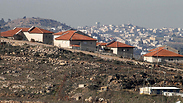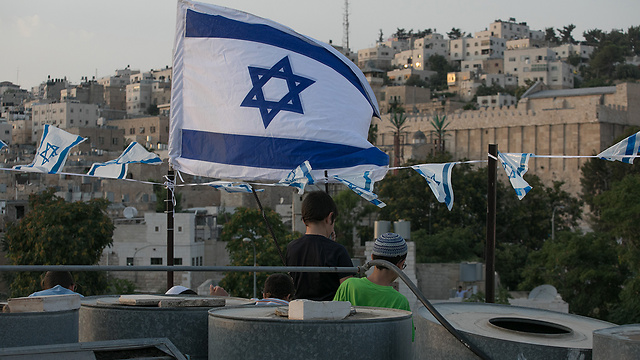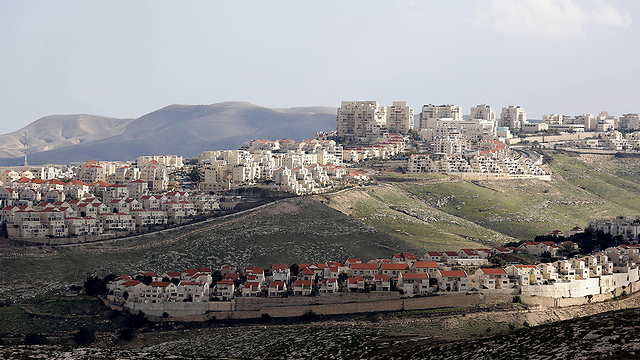
Settlement south of Hebron. There's no escape from a separation
Photo: AFP

Haim Ramon
Photo: Gil Yohanan

Good intentions on the way to a binational hell
Op-ed: One can’t support a separation through the two-state solution and simultaneously oppose the evacuation of settlers living beyond the settlement blocs. We will have to evacuate Jews living beyond the blocs into the blocs or anywhere they choose to live within sovereign Israel.
Every now and then, a groundless, captivating and allegedly “creative” idea is tossed into the public discourse: “Why evacuate settlements in Judea and Samaria in a peace agreement with the Palestinians? Just like Arabs live in the State of Israel, Jews will live under Palestinian sovereignty,
and the Redeemer shall come to Zion and to Palestine.”
Rumor has it that according to the “American initiative” too, not a single settlement would be evacuated. The intentions are good, but they will lead to hell rather than to a heaven of peace and coexistence.
The proposal, which appears to sound reasonable, requires a thorough examination. First of all, let’s look at the figures: There are some 400,000 settlers living in Judea and Samaria today, excluding the residents of Jerusalem’s Jewish neighborhoods beyond the Green Line, which clearly won’t be evacuated in any agreement. About 300,000 of them live in the large blocs, which are under a national consensus too. Even Palestinian Authority representatives have agreed that the blocs won’t be evacuated in any agreement, providing land swaps take place.
We are talking, therefore, about 100,000 to 110,000 settlers living outside the blocs across Judea and Samaria. According to surveys conducted during the Olmert government era, about 70 to 80 percent of them would eventually be evacuated voluntarily or willingly, mainly because they won’t want to live under Palestinian sovereignty.
Who would remain? About 20,000—the radical and hard core of the settlers, including Hilltop Youth. Almost all of them will remain, not in a bid to live in peace with their Arab neighbors under Palestinian rule, but in a bid to sabotage the agreement. There would be different kinds of clashes between them and the Palestinians on a daily basis. The IDF would be forced to intervene to protect these Israeli citizens, and that would lead to inevitable clashes with the Palestinian police in the delicate moments of the beginning of the agreement’s implementation. In any event, their stay is clearly a time bomb that will disrupt the agreement sooner rather than later.
Those who are saying, “Why don’t Jews live in the state of Palestine, like Arabs, live in the State of Israel?” have likely forgotten that Israel’s Arab residents are citizens who are committed to being loyal to the state and to its laws. Are they suggesting that the Jews who remain there will become citizens of the state of Palestine and commit to being loyal to Palestine? Those who are suggesting that the Jews living in Palestine will be permanent residents, like the Arabs in east Jerusalem who are permanent residents but not Israeli citizens, are ignoring reality too: Permanent residents are also committed to being loyal and obey the state they live in.
This suggestion is an escape from the need to preserve Israel as the Jewish state. There will be a need to evacuate the settlers beyond the blocs. It will certainly be painful, difficult and complicated. After all, these settlers settled beyond the blocs not because they were homeless, but for political and ideological reasons. Yitzhak Rabin saw the isolated settlements as political settlements and saw no security-related or Zionist need for them. Today, the goal of the settlements scattered outside the blocs, according to the settlers, is to thwart the two-state solution and create—knowingly or unknowingly—a binational apartheid state.
So there’s no escape from a separation. One can’t support a separation through the two-state solution and, at the same time, oppose the evacuation of settlers beyond the settlement blocs. Will we be here (including the blocs) and the settlers “there”? It will be our duty to evacuate the Jews living beyond the blocs into the blocs or anywhere they choose to live within sovereign Israel.
Some people may ask: Why deal with this now? Many people, after all, believe “there is no partner.” But even if that’s true, it means we would stick to the status quo as long as there’s no partner and let our enemies determine our fate. That’s exactly what Prime Minister Benjamin Netanyahu and Bayit Yehudi leader Naftali Bennett want.
In such a situation, it’s our duty to do what is best for the Jews and to make a unilateral decision on Israel’s borders: The main settlement blocs would be part of the State of Israel; any territory that is not included in them would not be part of it in a final agreement.
Once the decision on the borders of separation is made, the settlers outside the blocs would be offered a voluntary evacuation agreement with different alternatives, primarily settling within the boundaries of the blocs. The IDF would naturally remain active across Judea and Samaria just like it is today. This is the only way in the current reality that would save the State of Israel and rescue it from those who are leading it to a binational hell.
Haim Ramon served as a Knesset member and minister from 1983 to 2009 on behalf of the Labor Party and Kadima.

















